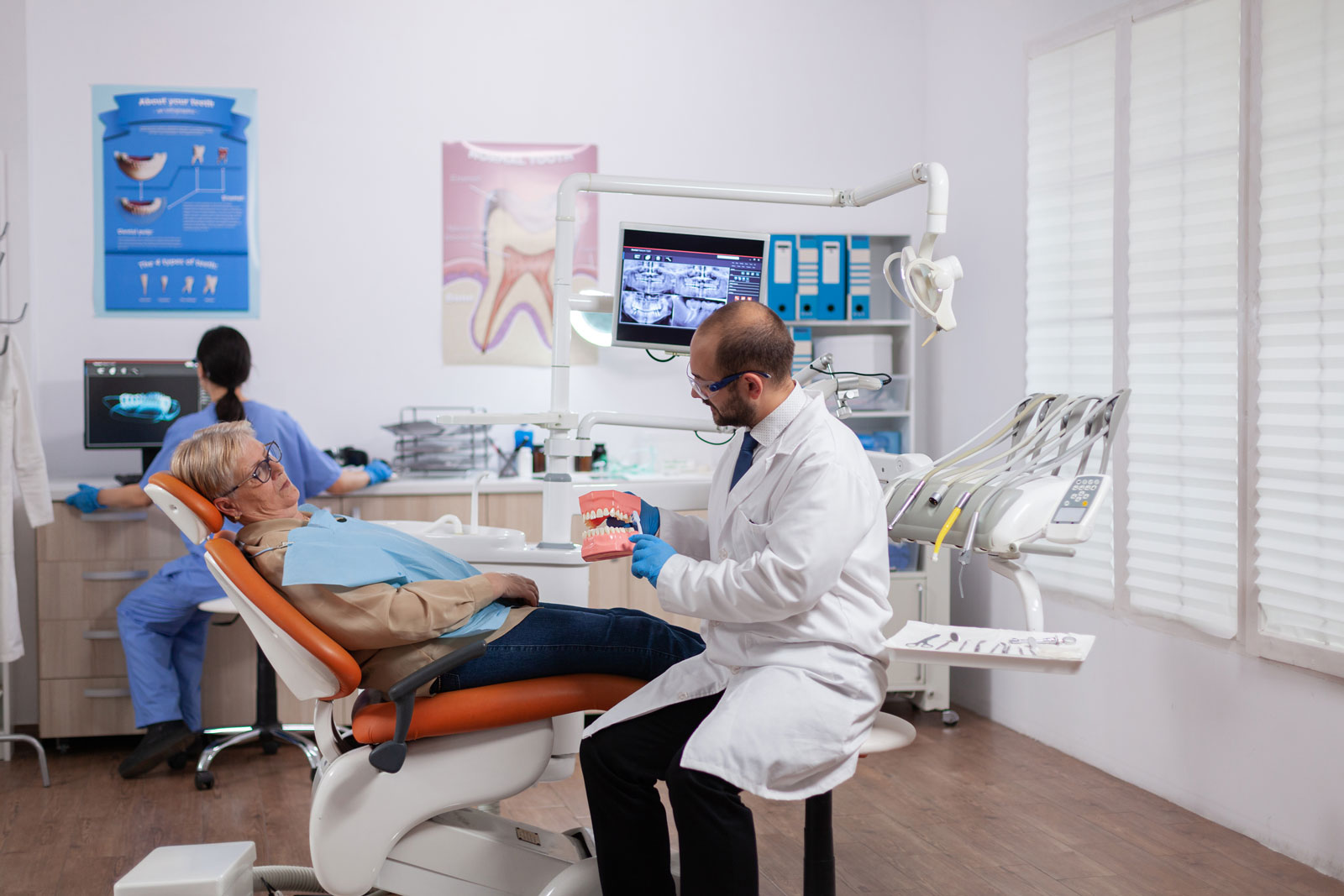The cleaning of dental calculus is the process of removing mineralized plaque or tartar that needs to be removed from the surfaces of teeth and the areas just below the gumline. This procedure is performed by dentists or dental hygienists and is important for maintaining oral health and preventing dental issues.
In summary, dental calculus cleaning is the process of removing mineral deposits that accumulate on the surfaces of teeth by a specialized healthcare professional. This process is important for maintaining oral health and preventing dental problems.
It is important for every individual to have regular dental calculus cleanings at intervals to maintain oral health.
For more detailed information on the subject, you can find it in the continuation of our article.
What Is Dental Calculus?
Dental calculus refers to the hard mineral deposits that accumulate on the surfaces of teeth or just below the gumline. In medical literature, it is also known as tartar. tooth calculus forms as a result of the combination of food particles, saliva, and bacteria in the mouth. When dental calculus accumulates on the surfaces of teeth or below the gumline, it can appear yellowish or brownish in color.
These deposits are hard and mineralized, making them difficult to remove with traditional oral hygiene practices such as brushing and flossing. The formation of dental calculus becomes more common when oral hygiene is not maintained, and regular dental cleanings are not performed. Additionally, in some individuals, the formation of dental calculus may occur more rapidly due to genetic factors, saliva composition, and dental hygiene habits.
The formation of tooth calculus can have a negative impact on oral health. Dental calculus can contribute to gum diseases (periodontal diseases) and tooth decay. Therefore, regular dental cleanings are important to prevent and control the formation of dental calculus.
Dentists or dental hygienists professionally perform the process of dental calculus cleaning using specialized tools. During this procedure, tooth calculus is removed, and oral health is supported.
What Causes Dental Calculus?
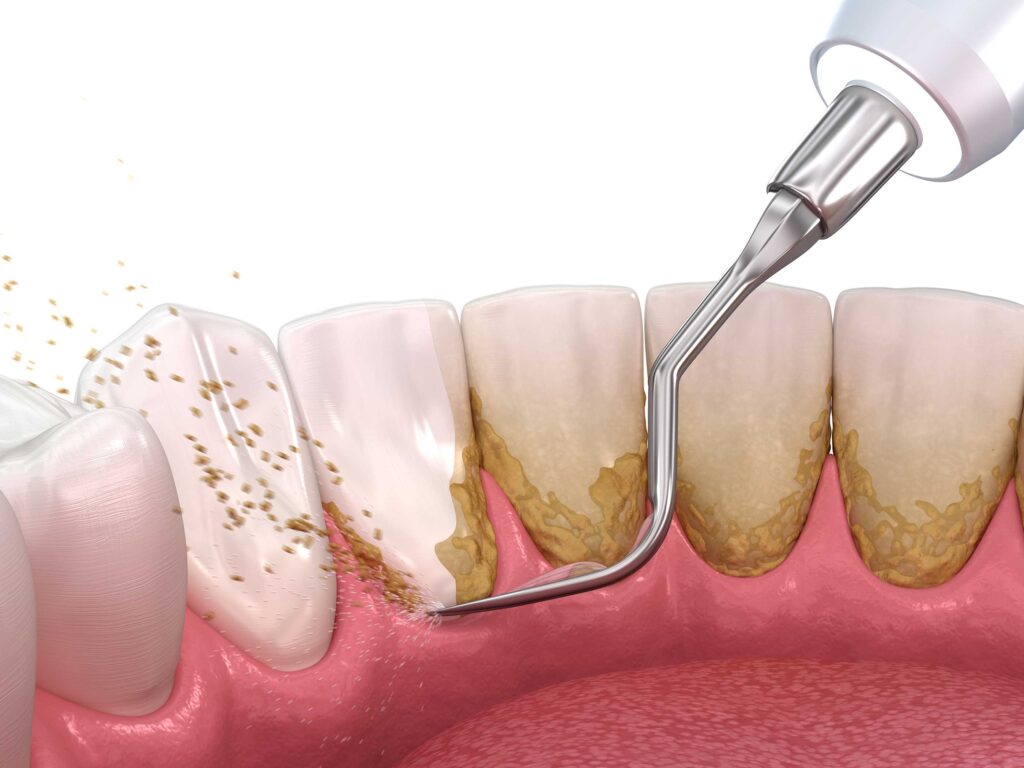
The main causes of dental tartar formation include:
Plaque Buildup: The combination of food particles, saliva, and bacteria in the mouth creates a sticky substance called plaque. Plaque accumulates on the surfaces of teeth and, over time, mineralizes to form dental calculus.
Insufficient Brushing and Flossing: Inadequate or irregular brushing and flossing encourage plaque formation, leading to the accumulation of dental calculus on teeth.
Genetic Factors: Some individuals are more prone to forming dental calculus than others. Genetic factors, saliva composition, and tooth structure can contribute to this difference.
Smoking: Smoking can accelerate the formation of dental calculus and make it more pronounced.
Diet: Carbohydrates such as sugar and starch can encourage bacteria to create plaque. Therefore, an unbalanced or high-sugar diet can increase the formation of tooth calculus.
Oral Hygiene Habits: Neglecting oral hygiene makes it easier for dental tartar to form. Brushing, flossing, and regular dental check-ups are essential to prevent tooth stone formation.
Tooth Anatomy: The structure and location of teeth can make certain areas more prone to tartar formation. In particular, the nooks and crannies of posterior teeth can facilitate plaque accumulation.
Regular dental cleanings and good oral hygiene habits are important for preventing and controlling the formation of tooth stone. Dentists or dental hygienists perform the process of dental tartar cleaning professionally, removing dental calculus deposits and helping to maintain oral health.
How to Clean Dental Tartar?
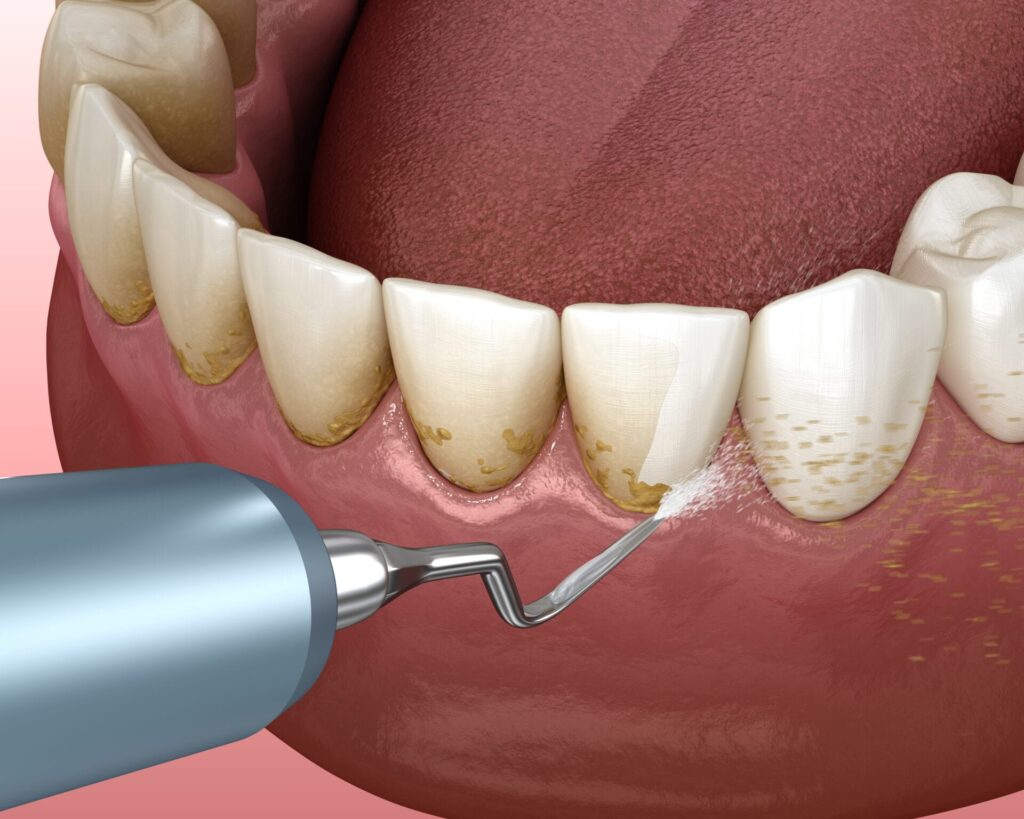
Professional dental tartar cleaning is necessary for removing dental calculus. Dentists or dental hygienists follow the steps below to clean dental tartar:
Examination: The dental calculus cleaning process usually begins with an examination. The dentist or dental hygienist assesses the tooth tartar and plaque deposits in the mouth. During this examination, gum health is also checked.
Use of Ultrasonic Device: Dental calculus cleaning is typically performed using ultrasonic devices. These devices use high-frequency vibrating tips to break down and remove tooth stone from the teeth and just below the gumline. Ultrasonic vibration is an effective method for removing dental calculus.
Use of Hand Instruments: In some cases, dentists or dental hygienists may use hand instruments for more delicate work. These hand instruments are used to carefully remove dental tartar.
Smoothing of Tooth Surfaces: During dental calculus cleaning, tooth surfaces are smoothed. This helps prevent the formation of new plaque deposits.
Gum Health Assessment: Gum health is observed during dental calculus cleaning. If there are gum issues, appropriate treatment may be recommended.
Polishing: Dental calculus cleaning usually ends with polishing the teeth. This makes the tooth surfaces appear brighter and cleaner.
Dental calculus cleaning is generally painless, but you may experience mild discomfort in some sensitive areas. After the procedure, your teeth will be cleaner and healthier. Your dentist or dental hygienist will recommend a personalized dental cleaning schedule (typically every six months) and plan according to your oral health. This way, you can control dental tartar formation and maintain oral health.
What Are the Benefits of Dental Calculus Cleaning?
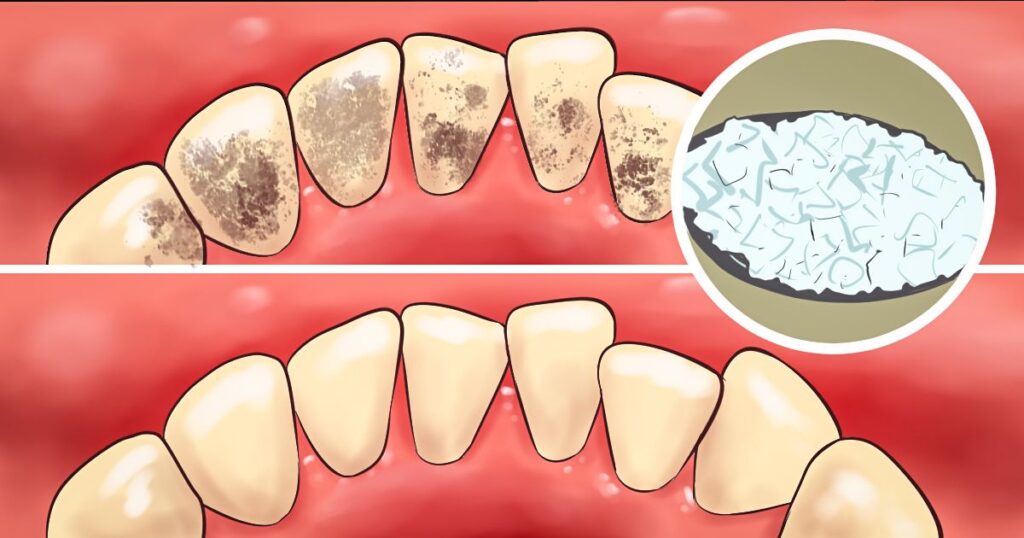
Dental calculus cleaning is an important preventive care procedure for maintaining oral health and preventing various oral problems. The benefits of dental calculus cleaning include:
Improves Dental Health: Dental calculus cleaning removes plaque and tooth stone buildup from tooth surfaces, leaving teeth cleaner and healthier. This helps prevent tooth decay and gum diseases.
Supports Gum Health: Tooth stone cleaning includes the removal of dental calculus below the gumline, which helps maintain gum health and contributes to the prevention of gum diseases like gingivitis.
Reduces Bad Breath: Dental calculus cleaning can help reduce bad breath. tooth stone can harbor bacteria that cause bad breath, and removing these deposits can result in fresher breath.
Enhances Dental Aesthetics: Dental calculus cleaning makes teeth appear whiter and brighter. Removal of tooth tartar can reduce stains and discoloration, improving your aesthetic appearance.
Prevents Tooth Loss: Dental tartar cleaning can help prevent tooth loss by aiding in the prevention of gum diseases and tooth decay. Preserving healthy teeth is an important way to prevent tooth loss.
Supports Overall Health: Oral health is closely linked to overall health. Dental calculus cleaning can reduce the risk of oral inflammation and gum diseases leading to other health issues.
Facilitates Dental Treatments: Cleaner teeth can make other dental treatments (e.g., fillings or dental implants) more effective and successful.
Regular dental calculus cleaning is important for maintaining your oral health and preventing dental problems. Your dentist or dental hygienist will determine an appropriate dental cleaning plan for you. Typically, dental tartar cleaning is recommended every six months, but it can be done more or less frequently based on individual needs.
How to Prevent Dental Calculus Formation?
People often tend not to take preventive measures until an issue arises. However, you can take the following measures to prevent dental calculus formation:
Regular Tooth Brushing: Brushing your teeth at least twice a day helps prevent plaque buildup and dental calculus formation. Learn the correct techniques for brushing and use a soft-bristle toothbrush.
Use of Dental Floss: Using dental floss after brushing or after meals helps clean food residues and plaque buildup between your teeth. Using dental floss can reduce dental calculus formation.
Proper Oral Hygiene Habits: Review your oral hygiene habits and stick to measures such as regular tooth brushing, dental floss usage, and mouthwash.
Regular Dental Checkups: Regularly visiting your dentist helps monitor your oral health and enables early detection of dental calculus formation. It can also help determine the recommended frequency and need for dental calculus cleaning.
Healthy Eating: A balanced diet can reduce dental calculus formation. Limiting the consumption of sugary and starchy foods can help reduce plaque buildup.
Fluid Consumption: Drinking water frequently increases saliva production in your mouth. Saliva creates a natural protective layer on your teeth that helps keep them clean.
Special Oral Care Products: Your dentist or dental hygienist can recommend special oral care products or types of toothbrushes that are suitable for you.
Maintaining regular oral hygiene habits and following your dentist’s recommendations will help minimize dental calculus formation.
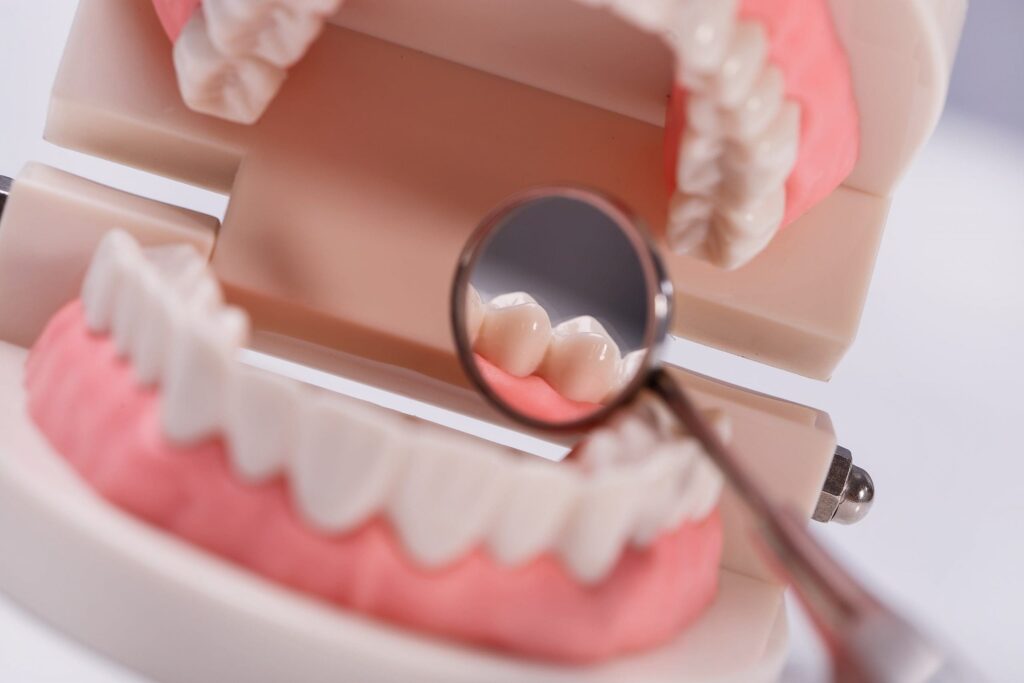
What Oral Health Problems Does Dental Tartar Cause?
Dental tartar can have various negative effects on oral health and can lead to the following health problems:
Gum Diseases: Dental calculus can contribute to the onset of gum diseases (periodontal diseases). Gum diseases result from inflammation and damage to the gums. They vary from mild conditions like gingivitis to more serious forms like advanced periodontitis. Dental calculus can help bacteria advance under the gums and trigger inflammation.
Tooth Loss: The formation of dental calculus can lead to gum diseases, and as these diseases progress, they can result in tooth loss. Dental tartar and plaque buildup can contribute to gum recession and loosening of teeth.
Bad Breath: Dental calculus can harbor bacteria that cause bad breath. This can lead to an increase in halitosis (bad breath).
Tooth Decay: Dental tartar can increase the accumulation of bacteria on tooth surfaces, which in turn raises the risk of tooth decay.
Tooth Sensitivity: Dental calculus can lead to the erosion of tooth surfaces and result in tooth sensitivity. Sensitive teeth may react more strongly to hot, cold, or sweet foods and beverages.
Dental Aesthetics: Dental calculus can cause tooth discoloration or staining, resulting in aesthetic concerns.
General Health Effects: Oral health is closely linked to overall health. Tooth stone and gum diseases have been associated with conditions such as diabetes, heart diseases, and other systemic health issues. Therefore, maintaining oral health can also improve overall health.
Regular dental cleanings and good oral hygiene habits can help prevent dental calculus formation and reduce the risk of such health issues. Your dentist or dental hygienist should conduct regular check-ups to monitor your oral health and detect problems early.
Does Getting Dental Calculus Cleaned Harm Teeth?
Dental calculus cleaning is generally a beneficial procedure for oral health and usually carries little to no risk of harm. Dental tartar is the accumulation of hard mineral deposits that form on the surfaces of teeth or below the gumline. These deposits can lead to the buildup of bacteria, contribute to gum diseases, and negatively affect oral health.
Dental calculus cleaning helps remove these deposits, improving oral health. Dentists or dental hygienists perform this procedure professionally, and it is typically painless. During the procedure, ultrasonic devices or specialized instruments are used, so the risk of causing harm to your teeth is quite low.
However, in some individuals, mild sensitivity or temporary gum bleeding may occur after dental calculus cleaning. These symptoms typically subside quickly.
An important point to remember is the necessity of having dental calculus cleaning done regularly. Your dentist or dental hygienist will determine an appropriate cleaning program and frequency for you. If regular cleanings are not performed, dental calculus accumulation can progress and lead to more serious oral health issues.
In conclusion, dental calculus cleaning is an important procedure for oral health and generally carries little to no risk of harm. Stay in regular communication with your dentist or dental hygienist and follow the recommended cleaning schedule to maintain your oral health.
Can Dental Calculus Cleaning Be Done at Home?
Dental calculus cleaning is a procedure that can only be performed by dentists and dental hygienists using professional tools. Otherwise, there is a high risk of causing harm to your gums and teeth. All at-home practices are directed toward preventing dental tartar formation. If you are experiencing dental calculus issues and are concerned, you can schedule an appointment with your dentist to determine the appropriate treatment method.
In the mouth, tooth stone is a condition where mineral deposits form on the surfaces of teeth and below the gumline. It begins with the accumulation of plaque, a combination of food remnants and bacteria, which eventually mineralizes into dental calculus. Dental calculus can lead to gum diseases, tooth decay, bad breath, and tooth sensitivity.
Dental tartar cleaning is performed professionally by dentists or dental hygienists using ultrasonic devices or special dental cleaning instruments to remove it from the surfaces of the teeth. Regular dental cleanings and good oral hygiene habits help prevent dental calculus formation and maintain oral health.


